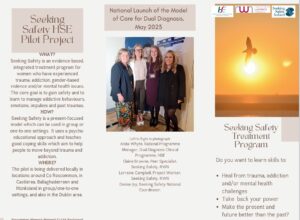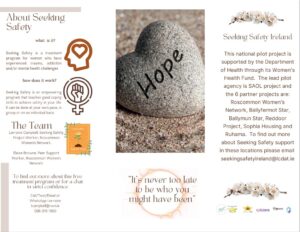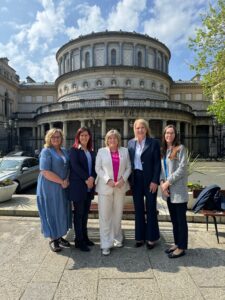Seeking Safety is an evidence-based, present-focused therapeutic model which teaches coping skills to help people attain safety from trauma and/or addiction (including addictive behaviours). It can be conducted in a group (any size) and/or on an individual basis. It is an extremely safe model as it directly addresses both trauma and addiction without requiring clients to delve into the trauma narrative.
The focus of our Seeking Safety pilot program is to support and empower women experiencing trauma, substance misuse, addictive behaviours, mental health issues and/or PTSD. The program teaches coping strategies which women can use to successfully create safety and wellbeing in their everyday lives, and where possible prepare women for the next stages in their journey.
The Seeking Safety project is funded through the Department of Health Mental Health Division and is run in partnership with six other community projects around the country. The other projects involved are – SAOL project, Ballyfermot Star, Reddoor Project in Drogheda, Ballymun Star, Sophia Housing and Ruhama.
For more information on Seeking Safety, please contact Lorraine in complete confidence on 086 0767869, or email lcampbell@rwn.ie.
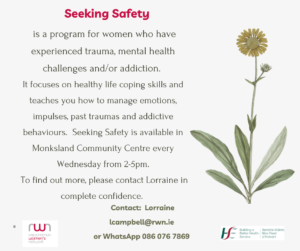 Seeking Safety is now available in Monksland. We have a clinic every Wednesday from 2-5pm in the Monksland Community Centre. We offer the program on a one-to-one basis and also group sessions.
Seeking Safety is now available in Monksland. We have a clinic every Wednesday from 2-5pm in the Monksland Community Centre. We offer the program on a one-to-one basis and also group sessions.
Please contact Lorraine in complete confidence on 086 076 7869 or email lcampbell@rwn.ie if you would like to find out more about the Seeking Safety program.
County Roscommon’s RWN is one of seven projects to benefit from the announcement of continual annual funding for the “Seeking Safety Ireland” treatment therapy program by Minister Mary Butler, Minister of State at the Department of Health with special responsibility for Mental Health and Older People.
L-R in photo: Anita Whyte, HSE Programme Manager, National Clinic Programme for Dual Diagnosis, Barbara Condon, CEO Ruhama, Minister Mary Butler, Minister of State at the Department of Health, Nora Fahy, Manager Roscommon Women’s Network and Dr Laura O’Reilly, CEO Ballyfermot Star.
Seeking Safety Ireland Evaluation Launch 9th February 2024 in Mansion House, Dublin
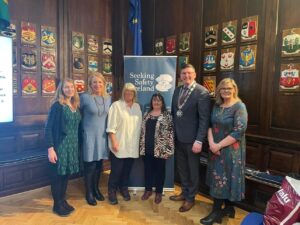 L-R in photo: Lorraine Campbell, Seeking Safety Roscommon Project worker, Nora Fahy, Manager RWN, KathyAnn Kelly, Independent Researcher, Trinity College, Maria Harris, Client Support Worker, HSE Community Care West Drug and Alcohol Services, Cllr John Keogh Cathaoirleach Roscommon County Council, Anita Whyte, HSE Programme Manager, National Clinic Programme for Dual Diagnosis.
L-R in photo: Lorraine Campbell, Seeking Safety Roscommon Project worker, Nora Fahy, Manager RWN, KathyAnn Kelly, Independent Researcher, Trinity College, Maria Harris, Client Support Worker, HSE Community Care West Drug and Alcohol Services, Cllr John Keogh Cathaoirleach Roscommon County Council, Anita Whyte, HSE Programme Manager, National Clinic Programme for Dual Diagnosis.
On 9th February 2024 Lord Mayor of Dublin, Daithí de Róiste, supported by Cathaoirleach of Roscommon County Council, Cllr John Keogh, launched the evaluation of a cross-agency Peer-led pilot programme, Seeking Safety Ireland, which supports women with a dual diagnosis of trauma and addiction.
Roscommon is the only rural county in the pilot, the other six projects taking part are urban based in Dublin and one in Drogheda.
The continued support of the Department of Health, Health Services Executive and other potential funders is critical for the continuation of the programme. ‘This evaluation has demonstrated the need for Seeking Safety across the entire country. The collaborative approach has maximised the outcomes for the women accessing the supports. The benefits for the Peer Support Workers and Peer Researchers is evident.’ Anita Whyte told the attendees at the launch in the Mansion house.
This sentiment was echoed by another Peer Researcher, Annemarie Sweeney who said at the launch: ‘At the moment we have over 400 women being supported to find safety in their lives and to make real and lasting changes. We have fully trained project support workers and peer support workers who are completely dedicated and committed to Seeking Safety Ireland who will probably lose their jobs.
‘This is not rocket science. We need funding for the Seeking Safety Ireland Programme. We know it works – this evaluation shows us that. This is not just about us and the people who went before us who didn’t get the help they needed. It’s about stopping it from continuing.’

